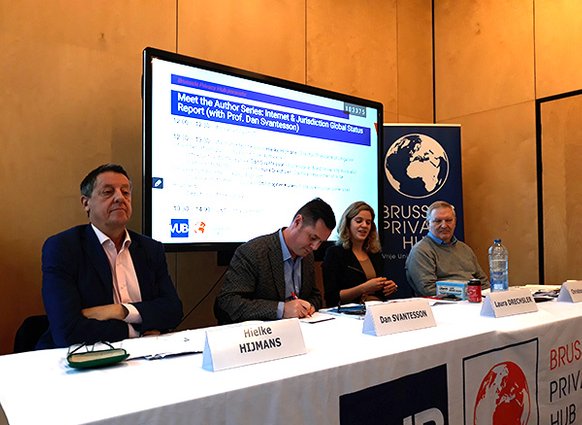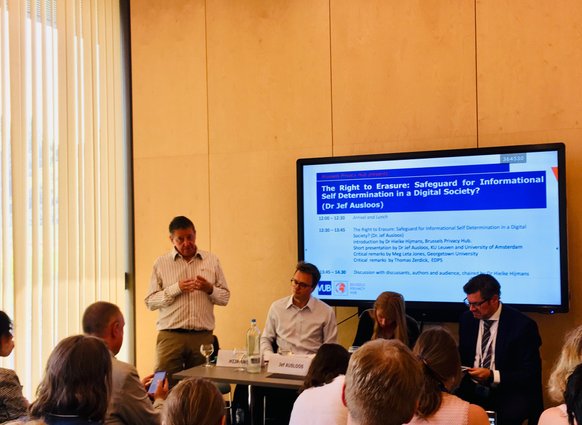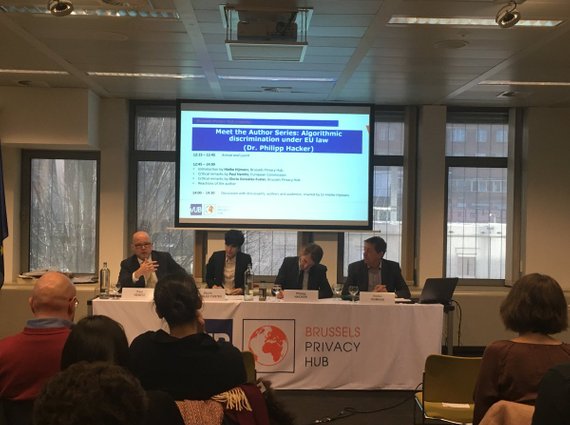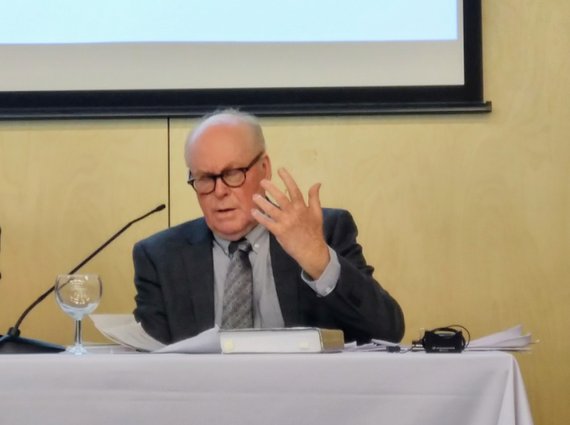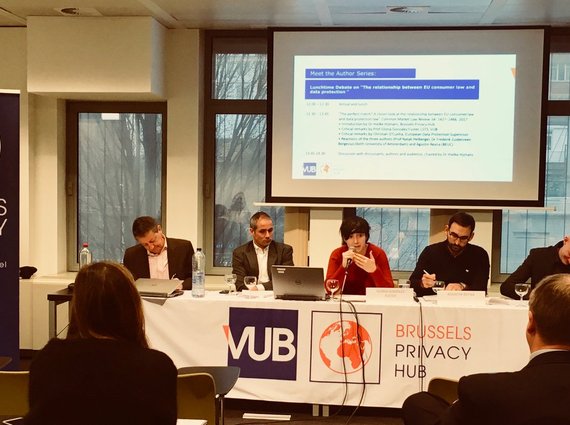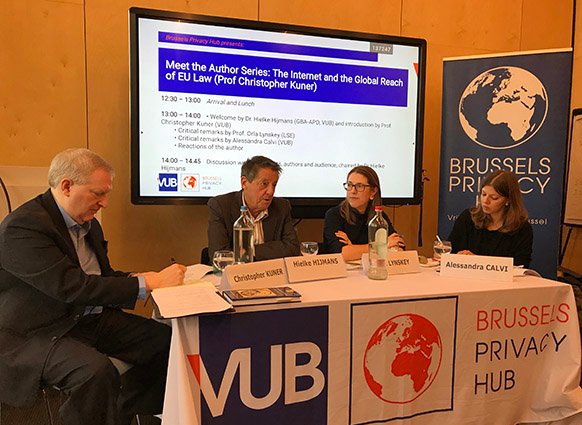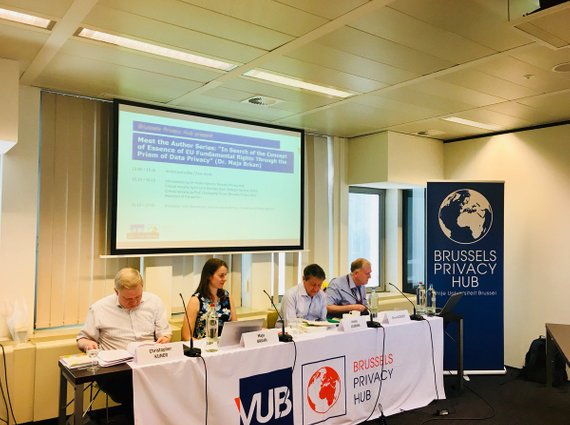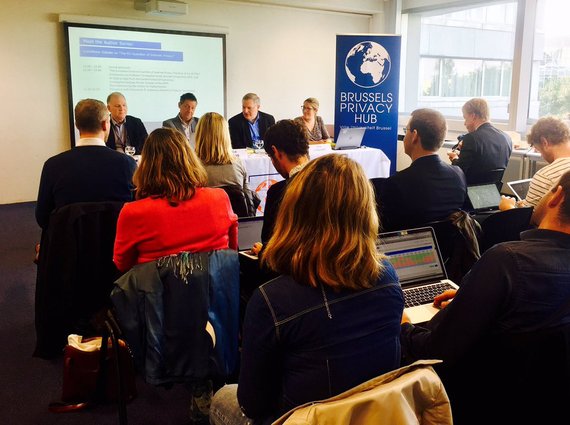Brussels Privacy Hub has moved to a new website as of 18 May 2022. The new website is available at www.brusselsprivacyhub.com. This version of the website will be stored for archiving purposes. Please see the new website for the latest updates.
Meet the Author Series
As Brussels Privacy Hub, one of our main objectives is to create a network of leading thinkers, coming from around the world and having different backgrounds, to foster an interchange of ideas with the ultimate goal to produce high quality privacy research. That is why, in 2017, the Brussels Privacy Hub launched the “Meet the Author Series”.
The concept at the basis of these lunchtime debates is to give authors of recent books and articles on privacy related issues the opportunity to present their works before a critical audience composed by academics, private sector practitioners, policymakers, fundamental rights advocates, European officials and so on.
The series hosts both experienced and leading thinkers, as well as younger scholars who wrote distinguished papers. Normally, we invite as discussants two famous experts in the field, one with a background in academia and one with a background as practitioner. They will give their review, which is followed by a reaction of the author. We end with a Q&A with the public on crucial questions.
Hereafter, a list of our “Meet the Author” events. Videos and summaries are available to ensure that those who could not attend are informed on the key points of the debates. The series is an initiative of Dr Hielke Hijmans of the Hub, who also chairs the debates.
Past Events
- 10 December 2020: Meet the Author Series: Web Privacy Measurement and the Power of online tracking technologies (Dr Rob Van Eijk)
- 9 December 2019: Meet the Author Series with Prof Dan Svantesson (Bond University, Australia)
- 4 October 2019: "The global reach of EU Privacy law" with Prof. Christopher Kuner
- 25 June 2019: "The right to erasure safeguard for informational selfdetermination in a digital society?" with Dr Jef Ausloos
- 27 March 2019: “Data Protection Directive for Police and Criminal Justice Authorities” with Juraj Sajfert and Teresa Quintel
- 17 December 2018: “Teaching Fairness to Artificial Intelligence: Existing and Novel Strategies against Algorithmic Discrimination under EU Law”. (Philipp Hacker)
- 7 November 2018: “Transatlantic Jurisdiction Conflicts in Data Protection Law: How the Fundamental Right to Data Protection Conditions the European Union’s Exercise of Extraterritorial Jurisdiction” (Mistale Taylor)
- 26 June 2018: "Threats to EU concepts of ‘adequacy’ from trade agreements and data export agreements in the Asia-Pacific" (Professor Graham Greenleaf)
- 20 April 2018: "In Search of the Concept of Essence of EU Fundamental Rights Through the Prism of Data Privacy" (Dr. Maja Brkan)
- 20 September 2017: “The EU as Guardian of Internet Privacy” (Dr Hielke Hijmans)
- 18 December 2017: “The relationship between EU consumer law and data protection” (Prof Natali Helberger, Dr Frederik Zuiderveen Borgesius & Agustin Reyna)
10 December 2020
Web Privacy Measurement and the Power of online tracking technologies (Dr. Rob van Eijk)
Author: Dr. Rob van Eijk (Future of Privacy Forum)
Paper: Web Privacy Measurement: Can WPM withstand the power of online tecking technologies? (Rob van Eijk & Jaap van den Herik)
Critical remarks by Ine Van Zeeland (imec-SMIT-VUB) and Rosa Barcelo (SQUIRE PB). The debate was chaired by Hielke Hijmans (Director/President of Litigation Chamber at Belgian Data Protection Authority).
9 December 2019
Internet and Jurisdiction Global Status Report
Author: Prof. Dan Svantesson (Bond University, Australia)
Book: Internet & Jurisdiction Global Status Report launched
Critical remarks by Christopher Kuner (Professor at Vrije Universiteit Brussels) and Laura Drechsler (Doctoral researcher at Vrije Universiteit Brussels / FWO Aspirant). The debate was chaired by Hielke Hijmans (Director/President of Litigation Chamber at Belgian Data Protection Authority).
Introduction: coming soon
25 June 2019
The right to erasure safeguard for informational selfdetermination in a digital society?
Author: Dr. Jef Ausloos (KU Leuven/University of Amsterdam)
Paper: “The Right to Erasure: Safeguard for Informational Self Determination in a Digital Society?”.
Critical remarks by Meg Leta Jones (Georgetown University) and Thomas Zerdick (EDPS)
Introduction: The thesis investigates the role of individual empowerment over personal data in countering power asymmetries online. This dissertation’s aim is to dissect ‘data empowerment’ in the information society through the lens of the right to erasure in Article 17 of the General Data Protection Regulation (GDPR). The conclusion is positive: the GDPR’s right to erasure does play a meaningful role.
17 December 2018
Algorithmic discrimination under EU law
Author: Dr. Philipp Hacker (Humboldt University of Berlin / WZB Berlin Social Science Center)
Critical remarks by Paul Nemitz (European Commission) and Prof. Gloria González Fuster (Brussels Privacy Hub / LSTS)
Introduction: The article discusses the impact of artificial intelligence applications for EU anti-discrimination law which may struggle to adequately capture algorithmic decision making, suggesting an integrated vision of anti-discrimination and data protection law to enforce fairness in the digital age. The GDPR toolkit, with independent data protection authorities and specific tools like a data protection impact assessment, could play an important role here.
26 June 2018
Threats to EU concepts of ‘adequacy’ from trade agreements and data export agreements in the Asia-Pacific
Author: Prof. Graham Greenleaf (University of New South Wales, Australia)
Publications: “Looming Free Trade Agreements Pose Threats to Privacy"; “Questioning ‘Adequacy’ (Pt II) – South Korea”; “Questioning 'Adequacy' (Pt I) – Japan”
Critical remarks by Fabian Delcros (DG JUST) and Prof. Christopher Kuner (Brussels Privacy Hub)
Introduction: The EU is negotiating with Japan and South Korea on adequacy, and this includes the compatibility of the concept of adequacy with the APEC’s Cross-border Privacy Rules (CBPRs) and its implementation in law. The articles ask whether, and under what circumstances, the APEC’s Cross-border Privacy Rules (CBPRs) could be an existential threat to EU adequacy.
18 December 2017
The relationship between EU consumer law and data protection
Authors: Prof. Natali Helberger (University of Amsterdam), Dr. Frederik Zuiderveen Borgesius (University of Amsterdam) and Agustín Reyna (BEUC)
Paper: "The perfect match? A closer look at the relationship between EU consumer law and data protection"
Critical remarks by Prof. Gloria González Fuster (Brussels Privacy Hub / LSTS) and Christian D’Cunha (EDPS)
Introduction: The article argues that the interplay of data protection law and consumer protection law provides exciting opportunities for a more integrated vision on “data consumer law”.
4 October 2019
The Internet and the Global Reach of EU Law
Author: Prof. Christopher Kuner (Professor at VUB)
Book: “The Internet and the Global Reach of EU Law"
Critical remarks by Hielke Hijmans, Director/President of Litigation Chamber at Belgian Data Protection Authority (Chair), Orla Lynskey, Associate Professor of Law at London School of Economics and Alessandra Calvi, Researcher at VUB
Introduction: Prof. Christopher Kuner of the VUB shows that the EU tends to assert itself as a global regulatory power consciously and deliberately with regard to the Internet. This means that the EU seeks to have its own legal standards adopted by third countries and at the international level, and asserts its regulatory authority towards activities in third countries that affect its interests and those of individuals within its borders.
Finally, EU law has had significant influence on the Internet, but the Internet has also influenced the development of EU law.
27 March 2019
Data Protection Directive for Police and Criminal Justice Authorities
Author: Juraj Sajfert (European Commission, DG JUST) and Teresa Quintel (Luxembourg University/Uppsala Universitet)
Paper: “Data Protection Directive (EU) 2016/680 for Police and Criminal Justice Authorities”
Critical remarks by Prof. Gert Vermeulen (Ghent University) and Cecilia Verkleij (European Commission, DG HOME)
Introduction: Directive (EU) 2016/680 covers an important area. Firstly, an increased number of criminal acts is being committed online or with the help of online tools. Secondly, as perpetrators are becoming more tech-savvy, LEAs turned to new investigative techniques, including big data analytics. Thirdly, EU rules (both the patchwork of data protection rules adopted under the former third pillar and the rules for EU Justice and Home Affairs Agencies) on the processing of personal data by LEAs are profoundly changed.
The paper gives a good overview of the main particularities of data protection in the area of police and justice by law enforcement agencies (LEAs), focusing on four focal points: profiling, indirect exercise of data subject rights, logs, international transfers.
7 November 2018
Transatlantic Jurisdictional Conflicts in Data Protection Law
Author: Dr. Mistale Taylor (Utrecht University)
Critical remarks by Anna Buchta (EDPS) and Frederik Zuiderveen Borgesius (LSTS / University of Amsterdam)
Introduction: The thesis examines the opportunities and limitations for the EU to exercise jurisdiction extraterritorially to safeguard data subjects’ fundamental right to data protection. In so doing unilaterally, the EU has been championing a value and fundamental right for its data subjects. This has inspired jurisdictional conflicts with – most notably - the US. The author claims that if the EU’s reach were strong enough to avoid or counter resistance, this would ultimately lead to fewer conflicts in jurisdiction as global standards would converge and, even in the EU-US data privacy law interface, commonalities and shared approaches to rights protection would emerge.
20 April 2018
In Search of the Concept of Essence of EU Fundamental Rights Through the Prism of Data Privacy
Author: Dr. Maja Brkan (Maastricht University)
Paper: "The concept of essence of fundamental rights in the EU legal order: Peeling the onion to its core"
Critical remarks by Dr. Herke Kranenborg (Commission Legal Service) and Prof. Christopher Kuner (Brussels Privacy Hub)
Introduction: The article aims to shed light on the notion of essence of fundamental rights that has been relied upon by the Court of Justice of the EU (CJEU) in the Schrems and Digital Rights Ireland cases. The article places the notion of essence into the framework of multi-level protection of fundamental rights in Europe, arguing that this concept has its origins not only in case law of the CJEU concerning the ‘very substance’ of fundamental rights, but also in the national constitutional traditions of Member States and the case law of the European Court of Human Rights. This article further elaborates on the constitutive elements of this notion and proposes a classification of the different types of breaches of the essence of fundamental rights. Finally, while elaborating on the relationship between the notion of essence and the principle of proportionality, this article proposes an EU methodology for determining a breach of the essence of a fundamental right.
20 September 2017
The EU as guardian of internet privacy
Author: Dr. Hielke Hijmans (Brussels Privacy Hub / LSTS)
Book “The European Union as Guardian of Internet Privacy, The story of Art. 16 TFEU”
Critical remarks by Dr. Orla Lynskey (London School of Economics) and Christopher Docksey (former Director EDPS)
Introduction: This book examines the role of the EU in ensuring privacy and data protection on the internet and shows that EU powers can be successfully used in a legitimate and effective manner and that this subject could be a success story for the EU, in times of widespread Euroscepticism.
Connect with us
Brussels Privacy Hub
Law Science Technology & Society (LSTS)
Vrije Universiteit Brussel
Pleinlaan 2 • 1050 Brussels
Belgium
Stay informed
Keep up to date of our activities and developments. Sign up to our newsletter:
Copyright © Brussels Privacy Hub

